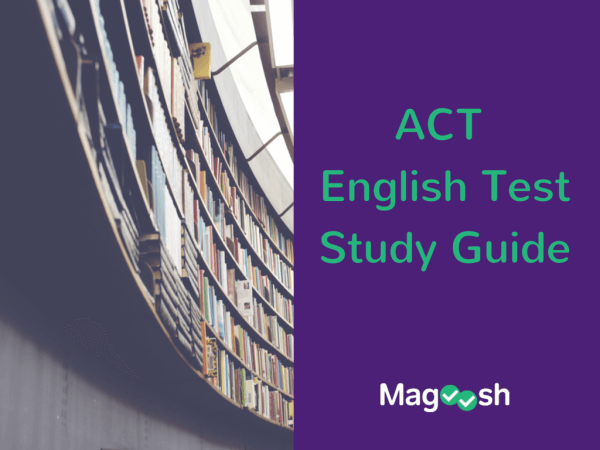ACT English Practice Resources
Looking for some free resources to help you improve your ACT English score? We’ve got you covered with our list of the best free resources for grammar review, sources for free practice tests, our own ACT English practice questions, and an ACT English study guide. You can follow the links below directly to the resources that interest you. Happy studying!
Table of Contents
- Best Free Resources for English Grammar Review
- Best Free ACT Practice Tests
- ACT English Practice Questions
- Answers and Explanations
- ACT English Study Guide
Best Free Resources for English Grammar Review
Grammar Bytes! is one of my favorite grammar websites for high school students. (Plus it has a great web address: chompchomp.com). Check out this site if you need a simple, straightforward explanation of a grammar term or rule. It also has interactive exercises to practice your skills.
Purdue’s Online Writing Lab (OWL) is more academic in tone (it is run by a university after all!), but it has long been my go-to authority on grammar as well as all things having to do with proper academic writing. Here you will find tons of helpful grammar explanations, writing advice, and worksheets.
Grammar Girl is also great if you want to totally geek out on comma splices and commonly confused words–although you will want to search for the grammar issues you have questions about; there is a lot to sort through, and the blog is not incredibly well organized.
And in case you are wondering exactly what grammar, usage, and style topics you should review for the ACT, we’ve made you a guide here!
Best Free ACT Practice Tests
You can find a full-length ACT test for free on the ACT student website along with five additional practice passages.
Although it’s not free, you should also do your best to get the Real ACT Prep Guide, which includes five official retired ACT tests. Check out your local library or school library if you can’t get a new copy. I highly recommend doing all of these tests as part of your test prep plan.
ACT English Practice Questions
Ready to try out some ACT English questions? Take a look at the brief passage and the five questions below!
In most busy cities and towns today, you can find automated teller machines, or ATMs, on practically every block. An ATM is an electronic communications device that allows bank customers to perform financial transactions without needing to talk to a human bank clerk. The first modern automated banking machine was developed in (1) 1969, by a Dallas engineer named Donald Wetzel. Wetzel’s machine used plastic cards like the ones we use today. It was not until the late 1970s and early 1980s, however, when more of the population (2) had became comfortable with the idea of (3) automated technology, that automated banking machines became truly popular. Some say that it took a good old-fashioned New York blizzard to truly make ATMs a permanent institution in American life. In 1977, the chairman of Citibank spent over $100 million dollars to install ATMs (4) all over New York City, hoping they would be a success. The following winter, a blizzard shut down banks in the city for days, and ATM usage suddenly increased by 20 percent. This blizzard also launched Citibank’s long-running “The Citi Never Sleeps” campaign, (5) with posters and billboards showing customers trudging through snow drifts to get to Citibank ATMs. After Citibank’s success, other banks followed suit, and ATMs popped up in every major city in the world.
1.
A. NO CHANGE
B. 1969;
C. 1969:
D. 1969
2.
E. NO CHANGE
F. had been becoming
G. have become
H. became
3.
A. NO CHANGE
B. automated technologies that automated banking
C. automated technologies, automated banking
D. automated technologies; automated banking
4. Which of the following is NOT an acceptable alternative for the underlined phrase?
E. all throughout
F. throughout
G. in
H. across
5. If the writer were to delete the underlined portion, deleting the comma and ending the sentence with a period, the paragraph would primarily lose:
A. an explanation of why so many people used ATMs during the blizzard.
B. descriptive detail about the imagery of the advertising campaign.
C. a restatement of an idea expressed earlier in the paragraph.
D. an explanation of why ATMs became necessary in the late 1970s.
Dying to know how you did ? Check out the answers and explanations below.
Answers and Explanations
1. d. 1969
In this case, we do not want to put a comma after 1969 because the prepositional phrase “in 1969” is connected to the following prepositional phrase “by a Dallas engineer.” So (a) is incorrect. (b) is incorrect because what follows the semicolon cannot stand alone as a sentence. (c) demonstrates an incorrect use of a colon. So our answer is (d).
2. h. became
On the ACT, we always want to err on the side of conciseness. Shorter is almost always better, which means (h) “became” should be a tempting option. But the real grammar issue we are tackling is verb tense consistency. The sentence tells us we are talking about the 1970s and 1980s, so we know we are talking about the past, so we can eliminate (g). Answer choice (e) “had became” is never correct; it should be “had become.” (f) “Had been becoming” is also too wordy and awkward, so our answer is (h).
3. a. NO CHANGE
The punctuation in the underlined portion depends on on the punctuation that is not underlined in the sentence. We have a subordinate clause (“when more of the population….with the idea of automated technology”) that needs to be set off with commas, so even though it might otherwise seem odd to put a comma before “that,” it needs to be there for that reason, so we can eliminate (b). (d) is incorrect because we do not have an independent clause before the semicolon that can stand alone as a sentence. And “c” is missing a key word “that” that helps link the information together, so it is incomplete. So our answer is (a).
4. g. in
This is an idiom question about preposition usage. We can say that something spread “throughout,” “all throughout,” “across,” or “all over” a city, but to say the ATMs were installed “in” New York City changes the meaning. The sentence intends to say that they were spread throughout. So (g) is our answer because it is the one that is not acceptable.
5. b. descriptive detail about the imagery of the advertising campaign.
On these questions, we always want to pay attention to the exact information contained in the underlined portion. (a) is incorrect because that underlined portion doesn’t explain why people used ATMs during the blizzard; it just says that they did. (c) is incorrect because that idea is not stated earlier in the paragraph. (d) is trickier because you can infer from the passage that people began to believe ATMs were necessary, but the underlined information doesn’t state that. So our answer is (b): the paragraph would lose descriptive detail about the imagery of the advertising campaign.
ACT English Study Guide
Didn’t do as well as you’d hoped on the above questions? Or just hungry for more ACT practice? We’ve got you covered! For the below schedule, you’ll need the FREE Magoosh ACT App and about an hour and a half. Happy practicing!
Today’s Tasks
Estimated time: 85 minutes
- DO 7 English Practice Questions, 20 min
- REVIEW Your practice session, 5 min
- WATCH English, Punctuation: Commas, 11 min
- WATCH English, Style: Concision and Wordiness, 3 min
- FLASHCARDS English: Punctuation and Grammar, 13 min
- WATCH English, Style: Redundant Meanings, 4 min
- WATCH English, Grammar and Usage: Verb Tense, 9 min
- WATCH English, Organization: Ordering Sentences and Paragraphs, 4 min
- WATCH English, Grammar and Usage: Subject Verb Agreement, 7 min
- WATCH English, Punctuation: Apostrophes, 9 min
About Tasks
- DO tasks can be found in the Study tab of this app (Practice Questions).
- For any question you get wrong, watch the video explanation (scroll down to see it).
- REVIEW tasks can be found by clicking “End Practice and See Results”. Scroll down. Note your % Correct, Pace, Subject and Difficulty level (scroll to the left).
- Write notes on areas of strength and weakness.
- Go back to app and Watch relevant English lessons.
- Click: End Practice and See Results. Scroll down. Note your % correct, pace, Subject and Difficulty level (scroll to the left).
- WATCH tasks can be found in the Study tab (Video Lessons) of this app.
- FLASHCARD tasks can be found in the Magoosh flashcard app. Download it here.





